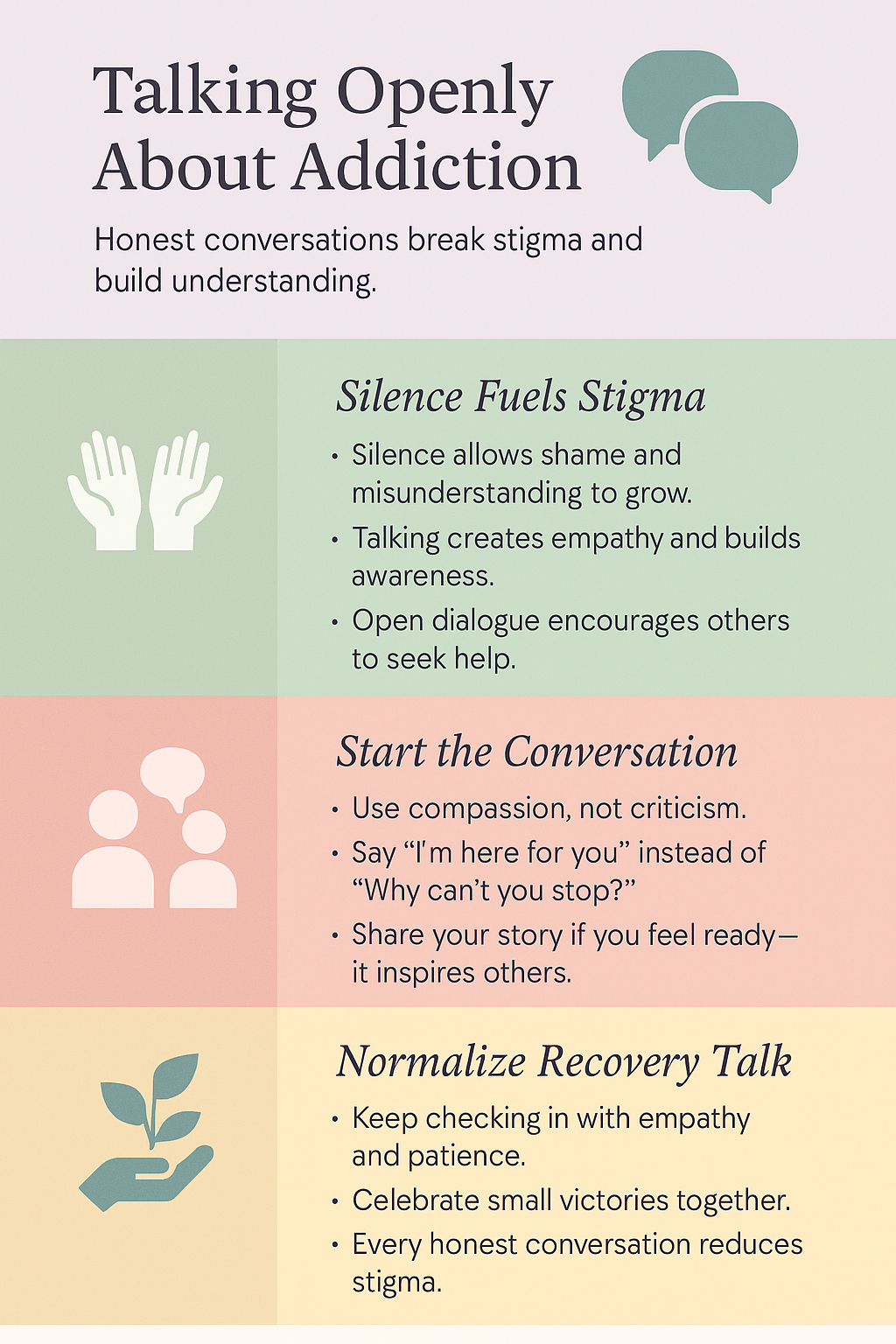Talking about addiction isn’t always easy, but it makes a massive difference for everyone involved. Honest conversations can spark real understanding, reduce shame, and set a positive path, whether someone is struggling personally or supporting a loved one. Many families, friends, and even workplaces don’t know where to start, so I’m putting together practical steps to help encourage open discussions about addiction and create an environment where people can speak honestly without fear.
Why Open Conversations About Addiction Matter
Addiction is more common than a lot of people think, but the stigma around it can keep conversations shut down before they even start. People dealing with addiction often isolate themselves because they’re scared of judgment or not being understood. This isolation can make recovery harder and leave loved ones feeling confused or powerless.
Creating an open space goes far beyond just having a chat; it builds trust and helps everyone feel less alone. Research shows that support from friends and family improves recovery and helps catch early warning signs. When the topic of addiction isn’t off-limits, it gets easier for people to ask for help, find resources, and work through challenging emotions together. Even healthcare groups like the Substance Abuse and Mental Health Services Administration (SAMHSA) highlight the importance of supportive talk and real-life stories.
I’ve seen situations where families don’t talk about addiction at all; people end up tiptoeing around the topic, which actually makes things worse. When conversations are open, there’s less shame and more room for problem-solving. Kids, parents, and friends have a better chance of understanding what’s happening and how they can help.
Getting Ready to Start the Conversation
Before discussing addiction, it helps to gauge your own feelings about the topic. Many people have their own nervousness or ideas shaped by what they’ve seen or heard. Thinking through your intentions and brushing up on some basics, like common signs of addiction, can make you much more comfortable and prepared when the moment comes.
Here are a few simple tips for prepping yourself:
- Do a bit of research: Learn about the type of addiction you want to discuss, whether it’s drugs, alcohol, or something else. Understanding basic terms and treatment options can help you answer questions or suggest resources.
- Check your mindset: Go in with an open mind and be ready to listen more than talk at first. Accept that it’s okay not to have all the answers right away.
- Pick the right time and place: Choose a moment when everyone is calm, and set up a relaxed environment. No one wants to have a big talk in the middle of a busy day or during a stressful event.
Talking to kids or teens, planning what you want to say in advance, anticipating questions, and using age-appropriate language can be conducive. Sometimes, bringing in a trusted third party, like a counselor, can smooth the way during the first talk.
Steps for Encouraging Open Conversations
- Lead with empathy: Approach the topic with care, not criticism. Use “I” statements to share how you’re feeling (“I’m worried about you because…”), which feels less accusatory.
- Ask open-ended questions: “How are you handling things lately?” or “What support do you need right now?” Encourage a real response rather than a yes/no shut-down.
- Listen without judgment: Avoid giving advice or interrupting right away. Just being present and listening can help someone feel more comfortable talking.
- Respect privacy: Ensure the conversation is confidential and the goal is support, not gossip.
- Offer support, not solutions: Sometimes, trying to fix everything at once can feel overwhelming. Let the person guide them on what kind of help they want; maybe it’s resources, or perhaps it’s just company.
- Acknowledge their feelings: Accept emotions like anger, fear, and sadness when they arise. Validating someone’s experience can be way more potent than simply offering advice.
Building these habits into your approach makes it easier for people to speak up and keep the conversation going.
Another handy tip: if you’re worried about saying the wrong thing, it’s better to admit, “I don’t know what to say right now, but I care about you,” than avoid the topic. This honesty lays a solid foundation for further discussion.
Challenges That Might Pop Up (and How to Handle Them)
Not every discussion about addiction goes smoothly, and a little bit of resistance or discomfort is normal. Here are some everyday bumps in the road, plus tips I’ve found helpful over the years:
- Defensiveness: Someone might deny there’s a problem or get angry. This usually isn’t personal; it’s just a reaction to a tricky topic. Keeping things calm and focused on the concern (“I care about you and want to help”) can, over time, cut through a defensive wall.
- Misinformation: There are a lot of myths about addiction. If someone seems confused, gently share facts or suggest checking a trusted source together, such as the SAMHSA website.
- Shame or guilt: These emotions run deep. Reinforce that having an addiction doesn’t mean someone is weak or broken; recovery is always possible, and mistakes are part of the process.
- Shutting down: If the person refuses to talk or walks away, don’t force it. Just leave the door open and let them know you’re always there to listen later.
Handling Defensiveness
I’ve been in talks where things suddenly get tense; maybe someone feels accused or misunderstood. When this happens, the best thing is to slow down and stick to your own thoughts, instead of blaming or bringing up the past. Take a break if things get heated, then try again later. Consistency and patience pay off.
Dealing with Misinformation
When someone insists on something you know isn’t true (“I can quit anytime I want; this isn’t a big deal”), repeating facts calmly and pointing to real success stories can sometimes help. Sharing info from reliable places keeps the focus on support, not on winning an argument.
Tips for Making Conversations Ongoing
Sparking one good conversation is excellent, but the most significant changes happen with ongoing, honest talk. Here’s how I keep things moving:
- Check in regularly: A quick message or a five-minute chat can remind someone they’re not alone.
- Celebrate small wins: Pointing out progress, no matter how small, builds confidence and hope.
- Stay patient: Everyone moves at their own pace. Letting go of expectations about timing or “fixing it” makes things less stressful in the long run.
- Encourage professional help: If things aren’t improving or get overwhelming, gently suggest contacting experts. Offer to help research clinics or make appointments if that feels helpful.
Being a consistent, caring presence without added pressure helps keep doors open for future conversations. The goal is to ensure your loved one knows you’re in their corner, no matter what. People are more likely to share openly when they don’t feel judged.
The Basics: Common Terms and Resources
Sometimes fear comes from not knowing which words to use or what options are available. Here are a few terms and resources worth knowing when talking about addiction:
- Substance Use Disorder (SUD): The official term doctors use instead of “addiction”, covering a range of dependencies.
- Recovery: The ongoing process of managing addiction and working toward a healthier life; it looks different for everyone.
- Detox: Safely removing substances from the body, usually done under medical supervision for specific drugs or alcohol.
- Support Groups: Organizations like Alcoholics Anonymous, SMART Recovery, or Al-Anon offer group support and meetings for those living with or affected by addiction.
- Hotlines: Crisis lines like 988 Suicide & Crisis Lifeline provide confidential help 24/7.
- Harm reduction: Programs or actions that aim to reduce the negative consequences of drug or alcohol use, rather than focusing only on stopping use completely. Services like needle exchanges or supervised consumption sites fall into this category and are worth learning about.
Many local organizations and community health centers also have support services or group meetings that can boost anyone seeking change or support. Don’t hesitate to reach out, even if you’re unsure exactly what’s needed.
Frequently Asked Questions
Many people have similar worries and wonder how to handle the early stages of these conversations. Here are a few common questions I hear:
Question: How do I bring up addiction without offending someone?
Answer: Focus on your care and concern, not accusations. Using “I” statements (“I’ve noticed you seem stressed lately, I’m here for you”) helps the other person not feel attacked.
Question: What if they don’t want to talk?
Answer: You can’t force someone to open up, but you can make it clear you’re always available. Just showing you’re willing to listen can make a difference in the future.
Question: How do I know if someone needs professional help?
Answer: If you notice changes in health, behavior, or mood that seem scary or dangerous, like blackouts, withdrawal from friends, or talking about self-harm, it’s a good idea to suggest talking to a doctor or mental health provider.
Question: What’s the best way to support someone after the first conversation?
Answer: Keep showing up. Send a supportive text, check in after appointments, and ask how things are going without pressure. Offer to go with them to meetings or appointments if that would make things easier. Consistency is key over time.
Moving Forward
Encouraging honest talk about addiction isn’t just about one conversation. It’s about showing consistent support, patience, and willingness to listen. Every time you break the silence, you help make things safer and less lonely for everyone involved. Being prepared, open, and knowing where to turn for resources gives you and those you care about a solid foundation.
No matter where you’re starting from, choosing to talk honestly about addiction creates space for better understanding, more substantial support, and real hope for change. Check out official sources like SAMHSA or speak to a local support group for more information. Small, supportive steps add up to real change over time. Remember, you don’t have to know everything to help someone start their path to recovery—what truly matters is your care and continued presence.
Video: Can Open Conversations About Addiction REALLY Save Lives?

